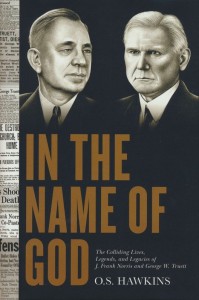 In the Name of God is a simply fantastic book for which O.S. Hawkins is to be commended. As a student at Southwestern Baptist Theological Seminary in the late 1990s I heard first the name of J. Frank Norris. What I heard was largely negative but nonetheless enthralling: that he had shot a man in his office and gotten away with it, that he was theatrical (preaching to a monkey about evolution, announcing he would out the affair of a prominent Ft. Worth business man from the pulpit only to have a number of businessmen call him and confess, etc.), that he was a fiery fundamentalist, that he started his own Bible college, and that he was the arch-nemesis of L.R. Scarborough, president of Southwestern Seminary after B.H. Carroll. That’s it. Oh, and that his church burned down a time or two under unusual circumstances and he was able to build bigger sanctuaries with the insurance money. I knew even less about Truett, though all of it was positive: that he was the legendary pastor of First Baptist Dallas for half a century and that…well, that’s probably about it! Now, all of that has changed!
In the Name of God is a simply fantastic book for which O.S. Hawkins is to be commended. As a student at Southwestern Baptist Theological Seminary in the late 1990s I heard first the name of J. Frank Norris. What I heard was largely negative but nonetheless enthralling: that he had shot a man in his office and gotten away with it, that he was theatrical (preaching to a monkey about evolution, announcing he would out the affair of a prominent Ft. Worth business man from the pulpit only to have a number of businessmen call him and confess, etc.), that he was a fiery fundamentalist, that he started his own Bible college, and that he was the arch-nemesis of L.R. Scarborough, president of Southwestern Seminary after B.H. Carroll. That’s it. Oh, and that his church burned down a time or two under unusual circumstances and he was able to build bigger sanctuaries with the insurance money. I knew even less about Truett, though all of it was positive: that he was the legendary pastor of First Baptist Dallas for half a century and that…well, that’s probably about it! Now, all of that has changed!
In the capable hands of O.S. Hawkins the full story is told. The book served to help this reader have a better and somewhat more positive understanding of Norris and a better and somewhat more negative view of Truett…which is simply to say that I see them both now as men of great gifts and great weaknesses, as human beings and not as caricatures. (The same can be said for this book’s effect on my understanding of Scarborough.)
Norris was the pastor of FBC Ft. Worth. Truett was the pastor of FBC Dallas. Hawkins does a very good job of showing how both men were symbols of the respective cities back in the day: Norris being more uncouth, more fiery, more “Wild West,” if you will, and Truett being more polished, more cultured, more “uptown,” if you will. There is some interesting history of the Dallas-Ft. Worth area in this book that I found helpful.
For the men themselves, both were amazing preachers who built huge churches to some extent on the force of their personalities but also in evidence of the hand of God on their lives. Both did amazing and helpful things for their communities…and both were, at times, their own worst enemies. They were also each other’s enemies, tragically, and maneuvered against each other in different ways. I was intrigued and saddened by how Truett would use and manipulate others to attack Norris publicly and by how Norris’ anger and paranoia would cause him to lash out eventually at even his own son. Both were men of ego and both, by all account, truly did love the Lord.
Hawkins’ account of how Southwestern Seminary ended up in Ft. Worth and of how Norris played such a big role in bringing that about was interesting. I had never heard that story. His account of the radio attacks on Norris that were orchestrated behind the scenes by Truett was likewise fascinating. I kept thinking that if Twitter had been around in that time it would have sounded just like Twitter does today, with ministers sniping and attacking each other to our own shame and detriment. Hawkins’ suggestion that Norris’ attack on Scarborough was possibly fueled by Scarborough, not Norris, getting the presidency of Southwestern after the death of Carroll was enlightening.
The absolute saddest parts of the book were (1) Norris’ lamentable behavior toward his son when his son was supposed to take over First Baptist Ft. Worth and (2) the possibility that Truett’s wife forbade Truett’s requested deathbed meeting with Norris for reconciliation from happening. That was heartbreaking to read about, though Truett’s request to meet Norris was laudable. Similarly, the deathbed reconciliation between Norris and Scarborough was touching.
As for Hawkins’ assessment of how the legacies of these men play into and impact the current milieu of the Southern Baptist Convention, the reader will have to make his or her own determination as to the usefulness and accuracy of Hawkin’s evaluation and conclusions. Regardless, it is an interesting question to ponder and Hawkins’ book will help you in making your own evaluations even if they differ from his own.
This is a cautionary tale and should be read by all pastors today and church attenders today. It is a tale about how ego can undercut our ministries and about how competition can undercut our ministerial friendships. It is a tale about unfettered ambition and the ruthlessness it can usher in. Perhaps more than anything it is a tale about how a good God can use deeply flawed people to accomplish great things.
Great, great book! Get it!
